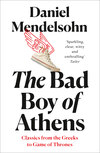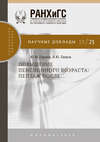Читать книгу: «The Bad Boy of Athens», страница 4
The second, ‘comic’, half presents the spectacle of the rambunctious Herakles’ arrival at the house of mourning (he is en route to yet another of his Labours); Admetos’s excruciatingly diplomatic efforts to keep up his reputation as a good friend and legendary host (he doesn’t want Herakles to know Alcestis has died lest his guest feel unwelcome); a drunken, feasting Herakles’ discovery of the truth, and his subsequent vow to bring his friend’s wife back; and the hero’s rescue of Alcestis after a wrestling match with Death himself, which takes place beside Alcestis’s tomb. The play ends with the eerie spectacle of a triumphant Herakles, like the father of a bride, handing over the veiled and silent figure of Alcestis to Admetos without, at first, telling Admetos who the woman is – teasing him in order to prolong the suspense. She never speaks again during the course of the play.
The hodgepodge of moods, styles, and themes suggested by even this cursory summary has made interpretation of this strange work particularly thorny. To cite John Wilson further:
Even the genre to which the play belongs is disputed – is it a tragedy, a satyr play, or the first example of a tragicomedy? Who is the main character, Alcestis or Admetos? And through whose eyes are we to see this wife and this husband? Is Alcestis as noble as she says she is? And is Admetos worthy of her devotion, or does he deserve all the blame that his father, Pheres, heaps upon him? And is the salvation of Alcestis a true mystery, a sardonic ‘and so they lived happily ever after’, or simply the convenient end of an entertainment?
These questions continue to puzzle classicists, despite radical shifts in the way we read classical texts. Since Wilson wrote in the 1960s, no literary-critical school has influenced classical scholarship so much as feminist studies has; and the Alcestis has proved an especially rich vehicle for scholars interested in demonstrating the extent to which literary production in classical Greece reflected the patriarchal bias of Athenian society during its cultural heyday. ‘The genre of the Alcestis,’ the classicist Nancy Sorkin Rabinowitz has written in a stimulating if perhaps too ideologically rigid study of Euripides’ handling of female characters, ‘… depends on gender. On the surface, it is comic: death leads to life, and a funeral resolves into a wedding. But is it a happy ending for Alcestis as well as for Admetos? Although funeral and wedding may seem to be opposites, they come to much the same thing for this woman.’
You don’t have to be a feminist hardliner to have your doubts about Admetos. Even at the very beginning of the drama, as Alcestis lies dying within the house, the king’s self-involvement takes your breath away. It is true that the laments he utters in his exchange with the dying Alcestis are all fairly conventional (‘Don’t forsake me,’ ‘I am nothing without you’), and yet their cumulative effect is unsettling: gradually, it strikes you that for Admetos this domestic disaster is all about him. Alcestis’s death, he cries, is ‘heavier than any death of my own’ – an appeal for sympathy that’s a bit much, considering that she’s dying precisely because he was afraid to. He’s Periclean Athens’s answer to the guy in the joke about the classic definition of chutzpah – the one who murders his parents and then throws himself on the mercy of the court because he’s an orphan.
Admetos makes the dying Alcestis several somewhat excessive promises: among them, a vow to ban all revelry for a full year, and an oath never to take another woman into his house. Yet by the end of the play he will have broken both: first when he allows Herakles to be feted with wine and music, and then when he accepts, as a man might accept a new bride, the anonymous veiled woman into his household – before he knows she’s Alcestis. Most bizarrely, he declares that he will have an artisan fashion a statue of Alcestis, which he will take to bed and caress as if it were she – a ‘cold pleasure’, to be sure, but one that will help to assuage his loss. For some critics, this has a fetishistic, doth-protest-too-much quality; whatever you make of it, it’s striking that, having promised to mourn Alcestis forever, her husband begins, before she even dies, to seek comfort (however cold) for himself.
So the husband is a weak man in the first part of the play. But he must be so, since whatever ‘tragic’ – or, for that matter, dramatic – development Euripides’ play has depends on Admetos’s evolution – on his starting out as a less than admirable man who comes to realize that the existence he has purchased with his wife’s life isn’t worth having precisely because he has lost her. ‘Now I understand,’ he exclaims at the play’s climax, right before Herakles enters with the resurrected Alcestis. Even so, this king is no hero: Alcestis’s miraculous return from the grave yanks her husband back from the brink of truly tragic self-knowledge, the kind he’d have acquired if he had had to live with his loss, as characters in ‘real’ tragedies do. (When they don’t kill themselves, that is.)
As it is, Admetos gets to eat his cake and have it, too. ‘Many readers will feel [his grief] does not change him enough,’ the Harvard classicist Charles Segal tartly observed in one of several penetrating essays he wrote on this play. Richmond Lattimore, who translated the Alcestis for the University of Chicago Greek Drama series nearly half a century ago, was moved, similarly, to question Admetos’s character, using the bemused rhetorical-question mode into which those who have grappled with the Alcestis keep falling, no doubt because the work’s violent wobbling between genres makes any definitive pronouncement seem foolhardy. ‘If a husband lets his wife die for him,’ Lattimore asked, ‘what manner of man must that husband be?’
Hughes’s Alcestis adaptation invites us to believe that this is, in fact, the wrong question to be asking. His version is wholly unconcerned with Admetos’s flaws, not least because in his version, Admetos has no flaws. Everything in Euripides that suggests we ought to question the husband’s character has here been excised; instead, it’s God who gets the rough treatment. It’s a striking alteration.
The clean-up job begins early on. In Euripides’ play we learn that Apollo, in gratitude for being well treated chez Admetos, has promised the mortal king that he will be able to avoid his death if he can find someone to die in his place; Admetos tries all his loved ones in turn until finally his wife agrees to die for him. But in Hughes’s version, Admetos is spared the embarrassing (indeed, damning) task of begging his relatives – and wife – for volunteers; here, it’s Apollo who ‘canvasses’ for substitutes. In fact, Apollo doesn’t even have to ask Alcestis, as in Euripides’ play Admetos most certainly does: she just volunteers. (It’s interesting that Hughes’s heroine is more faithful to her counterpart in the Greek original than his Admetos is to his; and when he gives her lines that Euripides didn’t – as when, in her farewell to her daughter, she pathetically exclaims, ‘She will not even know what I looked like’ – the drama is enhanced.)
Similarly, Hughes smooths away any sign of what Charles Segal calls the ‘unthinking self-centredness of the husband’. He erases the solipsistic whininess from Admetos’s laments at the beginning of the play. The breathtakingly self-involved utterances that Euripides puts in Admetos’s mouth, well translated by Lattimore – ‘sorrow for all who love you – most of all for me / and for the children’ and ‘Ah, [‘good-bye’ is] a bitter word for me to hear, / heavier than any death of my own’ – here become the considerably less galling ‘Fight against it, Alcestis. / Fight for your children, for me’ and ‘Good-bye! – don’t use that word. / Only live, live, live, live.’ (For American readers, at least, the latter will have an unfortunate Auntie Mame-ish ring.)
Most strikingly, Hughes eradicates any sense of the strange excessiveness of Admetos’s promise to build a replica of his wife, which in the new version becomes a dismissive, indeed incredulous, rhetorical question: ‘What shall I do, / Have some sculptor make a model of you? / Stretch out with it, on our bed, / Call it Alcestis, whisper to it? / Tell it all I would have told you? / Embrace it – horrible! – stroke it! / Knowing it can never be you …’ Hughes’s subtle rewriting inverts the whole point of the scene. The original hints disturbingly at the husband’s readiness to accept a substitute for the dead wife; the new version emphasizes the husband’s steadfast fidelity. (To further deflect blame from Admetos, Hughes makes his father, Pheres, particularly disgusting. Here the old man not only refuses to die for his son, but ‘screeches’ and ‘wails’ at the younger man to ‘Die … clear off and die.’)
Hughes’s alterations, ostensibly minor, ultimately sap the strength of Euripides’ dramatic climaxes. In the original, the culminating scene in which a veiled, voiceless Alcestis returns home to her husband on Herakles’ arm owes much of its eeriness precisely to Admetos’s deathbed promise, which has prepared us for the idea, however odd, that the king will settle for an inhuman facsimile of his dead wife; and lo and behold, at the ‘happy’ ending we see him holding hands with something that could well be such a dummy. But since Hughes has dispensed with Admetos’s vow, the climax loses all of its creepy potential. Once again, the translator’s embarrassment about the grand, bizarre qualities that so often characterize tragic action and diction takes its toll in dramatic effectiveness.
In the original, what leads us to a fleeting suspicion that Herakles’ companion is, in fact, nothing more than a statue is the figure’s total silence during a lengthy exchange between Admetos and Herakles – a muteness that clearly disturbs the other characters and, precisely because we’re afraid the silent woman might be just a simulacrum, a revenant, ought to disturb us, the audience, too. In Euripides, an agitated Admetos turns to Herakles and demands: ‘But why does she just stand there, voiceless?’ Fred Chappell’s rendering for the Penn Series nicely conveys Admetos’s agitation: ‘But why does my Alcestis stand so silent?’ In Hughes’s version, an ever-polite Admetos blandly murmurs, ‘Will she speak?’ You wonder whether he cares.
On the face of it, at least part of the reason for Hughes’s shifting of emphasis – and any suspicion of moral weakness – away from Admetos is that he wants his adaptation to be a grand dramatic and poetic statement about the triumph of the human spirit, about mortality and the victory of love over death. The husband and wife are idealized, whereas there’s a lot of complaining about ‘God’ and his pettiness and cruel indifference to human suffering (‘As usual, God is silent’). To bolster this cosmic interpretation of the original, Hughes adds, in the Herakles scene, elaborate riffs on Aeschylus’s antiauthoritarian Prometheus Bound, with its questioning of Zeus’s justice, and on Euripides’ own profoundly antireligious Madness of Herakles (in which the hero, freshly returned home from his labours, is temporarily maddened by a vengeful goddess and in his delusion murders his wife and children). And Hughes’s dark mutterings about ‘nuclear bomb[s] spewing a long cloud / of consequences’ and the accusatory descriptions of God as ‘the maker of the atom’ who is served by ‘electro-technocrats’ suggest as well that the poet had not given up his preference for primitive Nature over cold Culture.
Yet even as Hughes ups the thematic ante in his adaptation, formal problems seriously undercut his ambitions. Perhaps inevitably when dealing with Alcestis, the translation is, even more than his others, marred by the poet’s inability to find a suitable tone. In what looks like an attempt to convey the tonal variety of Euripides’ hybrid drama, Hughes experiments more than previously with slangy, playful diction. The results can be odd, and often betray the dignity of the original where it is, in fact, dignified. ‘You may call me a god. / You may call me whatever you like,’ Hughes’s Apollo says in his prologue speech, which in the original is crucial for setting the mournful tone of the entire first half. It’s a bizarre thing for Apollo to say: characters in Greek tragedies get zapped by thunderbolts for far less presumptuous haggling with divinities. (Alcestis begins, in fact, with a dire reference to Zeus’s incineration of the hubristic Aesculapius, Apollo’s son, who dared to raise the dead – the first allusion to the all-important theme of resurrection.) Apollo goes on: ‘The dead must die forever. / That is what the thunder said. The dead / Are dead are dead are dead are dead / Forever …’ You suspect Hughes is trying here to convey the thudding infinite nothingness of death, but bits like this are unfortunate reminders that the translator was also a prolific author of children’s books. The intrusion of comic informality is hard enough to adjust to in Euripides’ Alcestis, where the biggest moral problem is a husband’s gross inadequacies; but it’s a disaster in Hughes’s Alcestis, where the big moral problem is God’s gross inadequacies.
Hughes, it should be said, wasn’t the first widower poet for whom the opportunity to translate the Alcestis served as the vehicle for a corrective shift in emphases. In Robert Browning’s long historical poem Balaustion’s Adventure (the subtitle is ‘Including a Transcript of Euripides’), which was composed after the death of his wife, Elizabeth, a poetess comes to Athens from Rhodes to meet Euripides, and then sets about adapting Alcestis. But her version – and, by extension, the Browning version – turns out to be a redemptive one. In it, ‘a new Admetos’ rejects out of hand Alcestis’s offer to die in his place: ‘’Tis well that I depart, and thou remain,’ he tells his wife, with whom, indeed, he gets to enjoy a fairy-tale posterity. (‘The two,’ Browning writes, ‘lived together long and well.’) Hughes’s adaptation renovates Euripides along comparable lines. If the ancient dramatist’s Alcestis forces us to ask, ‘If a husband lets his wife die for him, what manner of man must that husband be?’ then the contemporary poet’s Alcestis asks, ‘If God lets people die, what manner of god must He be?’ In Hughes, as in Browning, there are no guilty husbands – no profound delving into the emotional (if not moral) squalor that often goes with being the survivor. There are just guilty abstractions.
Disturbing silences like the one with which Euripides’ Alcestis concludes are a leitmotif in the drama of Plath and Hughes. In Bitter Fame, her biography of Plath, Anne Stevenson describes a tiff between Plath and Hughes’s sister, Olwyn, that took place during the Christmas holidays in 1960: depending on whose side you’re on, the episode demonstrates either Plath’s irrationality or Olwyn Hughes’s coldness. In response to a remark of Olwyn’s that she was ‘awfully critical’, Plath ‘glared accusingly’ at her sister-in-law but refused to respond, keeping up her ‘unnerving stare’ in total silence. ‘Why doesn’t she say something?’ Olwyn recalled thinking. (That would have been an excellent translation of Admetos’s climactic line, conveying vividly the frustration and unease of someone faced with this particular brand of passive-aggressiveness.) As recently as a few years ago, Olwyn Hughes, in a letter to Janet Malcolm, was clearly still smarting from what Malcolm, in her book about Plath and Hughes, The Silent Woman, called Plath’s ‘Medusan’, ‘deadly, punishing’ speechlessness.
But if Plath was, like Alcestis, the ‘silent woman’, Hughes himself was the silent man – aggressively, punishingly so, at least in the eyes of those who wanted to know more about the characters in this famous literary/domestic ‘tragedy’, the passions of whose ‘characters’ only the language of Greek myth and classical drama, it sometimes seems, can capture. (‘They have eaten the pomegranate seeds that tie them to the underworld,’ Malcolm wrote; ‘I go about full with the darkness of my flame, like Phèdre …’, Plath herself wrote.) When Hughes’s Birthday Letters appeared in 1997, it met with a variety of reactions: horror, joy, shock, surprise, anxiety, enthusiasm, etc. But what everyone agreed on was that it was, in essence, a relief: finally, Hughes was speaking.
And why not? ‘Ted Hughes’s history seems to be uncommonly bare of the moments of mercy that allow one to undo or redo one’s actions and thus feel that life isn’t entirely tragic,’ Malcolm wrote. Birthday Letters was viewed by many as a kind of second chance, an opportunity to undo, or perhaps to redo, his public image with respect to his dead wife. (The same is true of the personal effects – passports, letters, photographs, manuscripts – that had belonged to Hughes, and which appear to have been the bases for several of the ‘Letters’. ‘He is thought of by critics as being so self-protective and so unrevealing of himself,’ said Stephen Enniss, the curator of literary collections at the Robert W. Woodruff Library at Emory University, which now owns Hughes’ papers. ‘I think the archive will make him appear more human, more sympathetic than the detached voice and aloofness we had known.’)
Writers – even those who appear aloof and voiceless about their private lives – can reveal themselves inadvertently. Reading Malcolm’s description of the trapped Hughes, I found it hard not to think of Euripides’ Alcestis, a play that notoriously allows a flawed man to undo and redo the fatal past. The undoings and redoings you find in Hughes’s almost inadvertently moving adaptation of that work – the elisions, omissions, and reconfigurations – suggest that the poet’s most revealing public utterance with respect to Plath may not have been Birthday Letters after all. In her way – her ‘veiled’ way – the most eloquent figure, among so many strange and tragic silences, has turned out to be Euripides’ silent woman.
– The New York Review of Books, 27 April 2000
The Bad Boy of Athens
In the early spring of 411 BC, Euripides finally got what was coming to him. The playwright, then in his seventies, had always been the bad boy of Athenian drama. He was the irreverent prankster who, in his Electra, parodied the famous recognition scene in Aeschylus’ Libation Bearers. He was an avant-garde intellectual who took an interest in the latest theorists – he is said to have been a friend of Socrates, and it was at his home that Protagoras (‘man is the measure of all things’) first read his agnostic treatise on the gods; in works like The Madness of Herakles, he questioned the established Olympian pantheon. Stylistically, he was a playful postmodernist whose sly rearranging of traditional mythic material, in bitter fables like Orestes, deconstructed tragic conventions, anticipating by twenty-five centuries a theatre whose patent subject was the workings of the theatre itself.
But no aspect of the playwright’s roiling opus was more famous, in his own day, than his penchant for portraying deranged females. Among them are the love-mad queen Phaedra, whose unrequited lust leads her to suicide and murder (the subject of not one but two Hippolytus plays by the poet, one now lost); the distraught widow Evadne in Suppliant Women, who incinerates herself on her dead husband’s grave; the ruthless granny Alcmene in Children of Herakles, who violently avenges herself on her male enemies; the wild-eyed Cassandra in Trojan Women; the list goes on and on. And, of course, there was Medea, whom the Athenians knew from established legend as the murderess of her own brother, the sorceress who dreamed up gruesome ways to destroy her husband Jason’s enemy Pelias, and whom Euripides – not surprisingly, given his tastes in female characters – decided, in his staging of the myth, to make the murderess of her own children as well.
And so it was that, shortly after winter was over in 411, the women of Athens had their revenge on the man who’d given womanhood such a bad name. Or at least they did in one playwright’s fantasy. In that year, the comic dramatist Aristophanes staged his Thesmophoriazousae. (The tongue-twister of a title means ‘Women Celebrating the Thesmophoria’ – this latter being an annual, all-female fertility festival associated with Demeter.) In this brilliant literary fantasy, Euripides learns that the women of the city are using the religious festival as a pretext to hold a debate on whether they ought to kill the playwright in revenge for being badmouthed by him in so many works over the years. Desperate to know what they’re saying about him, and eager to have someone speak up on his behalf – something no real woman would do – Euripides persuades an aged kinsman, Mnesilochus, to attend the festival in drag, spy on the proceedings, and, if necessary, speak in the poet’s defence. The plan, of course, backfires, Mnesilochus is found out, and only a last-minute rescue by Euripides himself – he comes swooping onto the stage, dressed as Perseus, in the contraption used in tragedies to hoist gods aloft – can avert disaster. Peace, founded on a promise by the playwright never to slander women again, is finally made between this difficult man of the theatre and his angry audience. The play ends in rejoicing.
Many contemporary classicists – this writer included – would argue that the females of Athens were taking things far too personally. Athenian drama, presented with much ceremony during the course of a public and even patriotic yearly civic festival, structured on the armature of heroic myth, rigidly conventional in form and diction, was not ‘realistic’; we must be careful, when evaluating and interpreting these works, of our own tendency to see drama in purely personal terms, as a vehicle for psychological investigations. If anything, Athenian tragedy seems to have been useful as an artistic means of exploring concerns that, to us, seem to be unlikely candidates for an evening of thrilling drama: the nature of the state, the difficult relationship – always of concern in a democracy – between remarkable leaders (tragedy’s ‘heroes’) and the collective citizen body.
In particular, the dialogic nature of drama made it a perfect vehicle for giving voice to – literally acting out – the tensions that underlay the smooth ideological surface of the aggressively imperialistic Athenian democracy. Tensions, that is, between personal morality and the requirements of the state (or army, as in Sophocles’ Philoctetes), and between the ethical obligations imposed by family and those imposed by the city (Antigone); and the never-quite-satisfying negotiations between the primitive impulse toward personal vengeance and the civilized rule of law (Oresteia). Greek tragedy was political theatre in a way we cannot imagine, or replicate, today; there was more than a passing resemblance between the debates enacted before the citizen members of the assembly, and the conflicts, agones, dramatized before the eyes of those same citizens in the theatre. Herodotus tells the story of a Persian king who bemusedly describes the Greek agora, the central civic meeting space, as ‘a place in the middle of the city where the people tell each other lies’. That’s what the theatre of Dionysus was, too.
This is the context in which we must interpret tragedy’s passionate females – as odd as it may seem to us today. The wild women characters to whom Aristophanes’ female Athenians so hotly objected weren’t so much reflections of real contemporary females and their concerns – the preoccupation of Athenian theatre being issues of import to the citizen audience, which was free, propertied, and male; we still can’t be sure whether women even attended the theatre – as, rather, symbolic entities representing everything ‘other’ to that smoothly coherent citizen identity. (Because women – thought to be irrational, emotional, deceitful, slaves of passion – were themselves ‘other’ to all that the free, rational, self-controlled male citizen was.) As such, Greek drama’s girls and women – pathetic, suffering, angry, violent, noble, wicked – were ideal mouthpieces for all the concerns that imperial state ideology, with its drive toward centralization, homogenization, and unity, necessarily suppressed or smoothed over: family blood ties, the interests of the private sphere, the anarchic, self-indulgent urges of the individual psyche, secret longings for the glittering heroic and aristocratic past.
For this reason, the conflicts between tragedy’s males and females are never merely domestic spats. Clytemnestra, asserting the interests of the family, obsessed by the sacrifice of her innocent daughter Iphigenia (an act that represents the way in which the domestic and individual realms are always ‘sacrificed’ to the collective good in wartime), kills her husband in revenge, but is herself murdered by their son – who later is acquitted by an Athenian jury. Antigone, for her part, prefers her uncle’s decree of death to a life in which she is unable to honour family ties as she sees fit. To be sure, this is a schematic reading, one that doesn’t take into account the genius of the Attic poets: men, after all, who had wives and mothers and daughters, and who were able to enhance their staged portraits of different types of females with the kind of real-life nuances that we today look for in dramatic characters. But it is useful to keep the schema in mind, if only as a counterbalance to our contemporary temptation to see all drama in terms of psyches rather than polities.
Two recent productions of works by Euripides illuminate, in very different ways, the dangers of failing to calibrate properly the precise value of the feminine in Greek, and particularly Euripidean, drama. As it happens, they make a nicely complementary pair. One, Medea, currently enjoying a highly praised run on Broadway in a production staged by Deborah Warner and starring the Irish actress Fiona Shaw, is the playwright’s best-known and most-performed play, not least because it conforms so nicely to contemporary expectations of what a night at the theatre should entail. (It looks like it’s all about emotions and female suffering.) The other, The Children of Herakles, first produced a couple of years after Medea, is Euripides’ least-known and most rarely performed drama: Peter Sellars’s staging of it in Cambridge, with the American Repertory Theatre, marks the work’s first professional production in the United States. That this play seems to be characterized far more by a preoccupation with dry and undramatic political concerns than by what we think of as a ‘typically’ Euripidean emphasis on feminine passions is confirmed by classicists’ habit of referring to it as one of the poet’s two ‘political plays’. And yet Medea is more political than you might at first think – and certainly more so than its noisy and shallow new staging suggests; while the political message of The Children of Herakles depends much more on the portrayal of its female characters than anyone, including those who have been bold enough to stage it for the first time, might realize.
By far the more interesting and thoughtful of the two productions is the Cambridge Children of Herakles. Euripides’ tale of the sufferings of the dead Herakles’ refugee children, pursued from their native land by the evil king Eurystheus and forced to seek asylum in Athens, has been much maligned for its episodic and ostensibly disjointed structure: the Aristotle scholar John Jones, writing on the Poetics, summed up the critical consensus by calling it ‘a thoroughly bad play’. But the imaginative if overcooked staging by Peter Sellars, who here effects one of his well-known updatings, suggests that it can have considerable power in performance.
The legend on which this odd drama is based was familiar to the Athenian audience, not least because it confirmed their sense of themselves as a just people. After his death, Herakles’ children are pursued from their native city, Argos, by Eurystheus – he’s the cruel monarch who has given Herakles all those terrible labours to perform – and, led by their father’s aged sidekick, Iolaos, they wander from city to city, seeking refuge from the man who wants to wipe them out. Only the Athenians agree to give them shelter and, more, to defend them; they defeat the Argive army in a great battle during which Eurystheus is killed – after which his severed head is brought back to Herakles’ mother, Alcmene, who gouges his eyes out with dress pins. (There was a place near Athens called ‘Eurystheus’ Head’, where the head was supposed to have been buried.) The legend was frequently cited in political orations of Euripides’ time as an example of the justness of the Athenian state – its willingness to make war, if necessary, on behalf of the innocent and powerless.
And yet Euripides went to considerable lengths to alter this mythic account precisely by adding new female voices. In his version, the two most significant actions in the story are assigned to women. First of all, he invents a daughter for Herakles, traditionally called Macaria but referred to in the text of the play simply as parthenos, ‘virgin’; in this new version of the famous patriotic myth, it is not merely the Athenians’ military might that saves the day, but Macaria’s decision, in response to one of those eleventh-hour oracles that inevitably wreak havoc with the lives of Greek tragic virgins, to die as a sacrificial victim in order to ensure victory in battle. The playwright also makes Alcmene a more vigorous, if sinister, presence: in this version, it is she who has Eurystheus killed, in flagrant violation of Athens’s rules for the treatment of prisoners of war. The play ends abruptly after she gives the order for the execution.
Начислим
+41
Покупайте книги и получайте бонусы в Литрес, Читай-городе и Буквоеде.
Участвовать в бонусной программе









